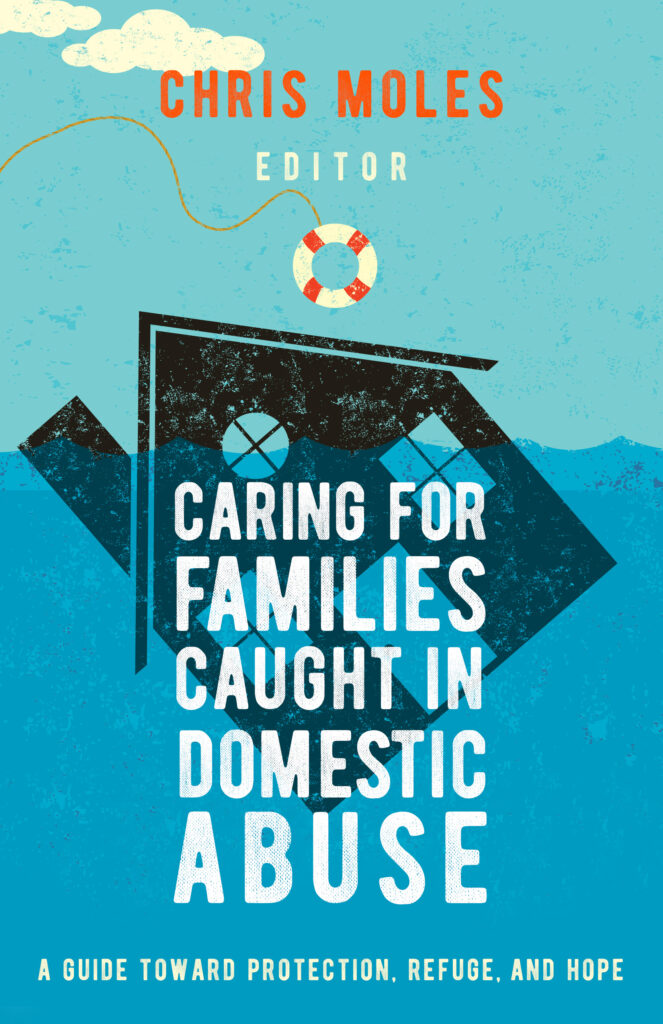Ed Welch helps us understand the importance of the church’s response to domestic violence:
Domestic anger and violence deserve our immediate attention, even when there is only a mere hint of a problem. . . Although the state can certainly help when women are victimized by their husband’s anger, the church must respond and take action. God hates injustice. This might be one of the few times when those who help are called to righteous indignation. Men, and even women, err in underestimating how difficult it can be to live with an angry spouse.
Edward T. Welch, “Counseling Problems and Procedures,” Lecture 2, CCEF School of Biblical Counseling.
Isaiah 1:17 exhorts the church to “Learn to do good; seek justice, correct oppression; bring justice to the fatherless, plead the widow’s cause” (emphasis added). In fact, over and over again throughout the Old Testament, God condemns oppression. From the beginning, God had a plan to rescue us from oppression in all its forms: our own sin, sins committed against us, and the (temporary) deeds of the evil one—that plan is Jesus. At the beginning of his ministry in Luke 4, Jesus said that he came to “set at liberty those who are oppressed” (v. 18). Because our Christian life is one of being conformed to his image, of course we want to follow his example. But how do we engage with oppression in our local church?
Let’s start by considering a few questions: What if the church—your church—endeavored to stop domestic abuse and to address the physical, spiritual, and emotional needs of the abused and the abuser with the hope of healing and restoration? What if your church’s primary concern was for the soul of each person trapped in a destructive cycle of abuse?
This is a plea from my heart to the reader, particularly to church leaders—pastors, elders, and deacons—who desire to shepherd the flock among you. My desire is to encourage you undershepherds as you seek to minister in a complex, confusing, time-consuming, and redemptive ministry. I want to help you think through how to address domestic abuse in your church in a biblically faithful, organizationally sustainable, and practically helpful way. By the end of this chapter, my prayer is that you will have some tools to begin recognizing and responding to domestic abuse for the strengthening of the church, her people, and their families.
For the counselors who are reading, please keep reading. If you are seeing abused or abusive believers in your practice, most likely they attend or are members of a church. By reading this book, you will have a sharper picture of how you can help church leaders shepherd their people from your seat on the bus. Your understanding of a vision and process allows you to serve your counselee by helping the pastor(s) minister knowledgeably and wisely.
These topics are extremely important. Abuse, oppression, or destructive relational patterns—whatever you want to call these chronic, intractable, besetting, deeply entrenched ways of mistreatment that happen within the covenantal marital relationship—require that we develop good theological frameworks and address these issues with love, reason, and conviction. Proverbs reminds us that there is no such thing as cookie-cutter ministry. “Answer not a fool . . . answer a fool . . .” (Proverbs 26:4–5).
The church (including me) needs to grow in the skill of Pauline conversation: listening to understand, speaking the truth in love, letting ministry help us read Scripture, and making sure ministry is rooted in Scripture. Paul equips us in Ephesians 4:25–32 with great tools for productive conversations and one-another care.
The Biggest Question
I am going to address what is probably the most-asked question first: How do I know it is abuse?
This is a difficult question, and it’s easy to not want to step into a situation because you are afraid you don’t know the answers. The biggest roadblock to wise domestic abuse ministry is fear: fear of the topic; fear that the ways of the world are creeping into the church; fear of the complexities of private, intimate relational sins; fear of getting it wrong; fear of getting it right; of the impact on church relationships; fear of disagreement; or fear of missing something. And these are just a few fears!
But remember Paul’s words to Timothy, “For God gave us a spirit not of fear but of power and love and self-control” (2 Timothy 1:7). Fruitful ministry starts with faith-filled, encouraged ministers. God’s people don’t run from hard things. Because the Lord helps us, we— like Jesus—set our faces like flint (Isaiah 50:7). You have the God of the universe who has given you everything you need for “life and godliness” (2 Peter 1:3) in your ministry to God’s people. His gifts include the Word (preached, taught, read, and lived), the empowerment of the Spirit, the example of the ministry life of Jesus, and a willing heart. Take heart!
Don’t Miss the Signs
You are going to encounter these ministry situations if you haven’t already. In fact, you probably already have, even if you don’t know it. It’s easy to miss, and one of the biggest reasons is that it is exceedingly rare for a woman to present with the words “I am being abused by my husband.” Uttering these words provokes feelings of deep shame and fear. There are several reasons for this.
First, most believing wives do not want to speak of their husbands in disrespectful ways. The Bible teaches that wives are to respect their husbands, and women who take those words to heart (which are most women in the pew) are also the ones least likely to want to disrespect him by exposing his sin to others. In Bible study, women are reticent to share hard marriage dynamics for fear that they may be gossiping. By the time a woman reveals that something abnormal is going on in the home, she has read many marriage books, studied how to be a more godly wife, floated ambiguous questions in smaller group settings, and tried countless ways to be a better wife and mom. Most women do not want a divorce. Most women in the church want God-honoring marriages and deeply desire to respect and love their husbands.
Second, very few believing women understand what is happening when they experience oppression. They find it very difficult and heartbreaking to consider what is happening to them. It feels shameful to share being repeatedly called words that we can’t print in this book, being shouted at nose to nose, or relentlessly and wrongfully accused of always dishonoring God or having bad motives toward her husband. How can this be happening to me? she thinks. I love him! I am trying to love him better.
This means that when she finally gets the courage to talk to someone, she often can’t tell a linear story, and she will tend to focus more on her own sin than what she is experiencing. She will most often present with tears and despair, be defensive of her husband, seem confused, and express a deep desire to honor God in her marital relationship. (As a side note, it is not unusual for a friend or small group member to reach out on behalf of a woman or a couple in a hard or painful marriage. In these kinds of marriages, often people have tried to help with advice and counsel, but it has not borne fruit. So they reach out to a pastor or staff member to ask for help and/or resources.)
Guiding Principles for Helpers
Let me just offer the following six guiding principles to help you care well when a woman first seeks you out:
- Listen compassionately and wisely and invite her to bring a friend or have another woman in the room. Few elders really understand that it takes a lot of courage for most people to talk to elders about things that aren’t going so well. So as she shares, keep in mind that there are a lot of thoughts and emotions coursing through her.
- Reassure her that you are hearing her and are leaning in. Saying, “I hear you and I am continuing to listen,” lays the ground for providing wise, protective counsel while allowing you to gather the necessary information you need to minister well.
- Ask clarifying questions so that you have a good understanding of what she is sharing. In this first meeting, you are asking good questions that help both you and her understand her situation better, as Jesus did over and over again. This is where you want to assess whether there is danger to anyone in the home. Have there been threats or actual physical violence? Have resources been cut off? Have children been harmed?
- Minister to her. Let her know that you are glad she came for help—it’s what congregants are supposed to do when they are in deep waters! Stop and pray with her. Whatever is going on—whether or not it’s on the spectrum of abuse—something is wrong and she needs help. Consider using the questions in appendix A on page 202 to help her accurately share what life is like in her home. See chapter 4 to better understand the abuse victim is experiencing.
- Collaborate with her to decide helpful next steps. Does she want you to reach out to her husband? Does she need a referral for wise, trained counseling? Work together to identify and articulate the next several steps. (This is where the friend with her can be particularly helpful.)
- Communicate clearly what help you are offering, who you will be sharing information with, and what level of information you will share. These are intimate details of her life and marriage, and care should be taken with them. Console her and pray with her again.
We address domestic abuse in the church for the same reason we address any other struggle or entrenched sin—to restore worship to God. My prayer is that we all—abused, abuser, elders, counselors, helpers—will worship at the feet of Jesus together. O glorious day!
Excerpted from Caring for Families Caught in Domestic Abuse: A Guide toward Protection, Refuge, and Hope © 2023 by Chris Moles. Used with permission of New Growth Press. May not be reproduced without prior written permission.
Caring for Families Caught in Domestic Abuse
Caring for Families Caught in Domestic Abuse is a comprehensive, Christ-centered response to the spiritual, emotional, and physical harm that domestic abuse causes to the abused spouse, the abusive spouse, and their children. Written by an experienced team of biblical counselors, Caring for Families Caught in Domestic Abuse editor Chris Moles and contributors Darby Strickland, Joy Forrest, Greg Wilson, Kirsten Christianson, and Beth Broom are all leaders in biblical domestic abuse ministry in the local church.






